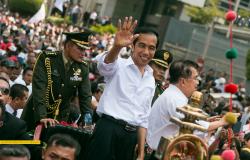Would the President of Indonesia have Signed the Decree on Agrarian Reform had the GLF been Held Elsewhere?

Hosted by the International Land Coalition (ILC), the GLF brought together ILC members, activists, local and international NGOs and government agencies from around the world to discuss land governance, food security, poverty and democracy. Held every three to four years, this year’s GLF was held in Bandung, Indonesia in recognition of the Asian-African conference (also known as the Bandung conference) – the first large-scale meeting of Asian and African states which took place in Bandung in 1955. In this short piece, I reflect on whether the President of Indonesia would have signed the decree on agrarian reform had the GLF been held elsewhere.
On 24th September 2018, during the first day of the Global Land Forum (GLF), my twitter feed exploded with tweets telling me that the President of Indonesia, Joko Widodo, had just signed the decree on agrarian reform. A special task force has also been created to deal with agrarian issues involving the coordinating economic minister and representatives from other ministries. This reform has come after years of governmental efforts towards an agricultural reform. Not only is the government trying to tackle widespread agricultural issues in Indonesia but they have also received pressure from various developmental and human rights-based organisations to give Indigenous and other rural communities greater control of over 127,000 sq km of land. It is widely hoped that this decree will address various land rights issues, including the distribution of land certificates and forest land plots – recognising that, as of 2015, only 80 out of a potential 126 million plots of land had been certified. President Wikodo also hopes that this reform will reduce land conflict and land deprivation facing a huge number of rural Indonesian people.
A core pillar of the ILC and its network surrounds agricultural issues and rural people and, in this light, in the weeks and days running up to the GLF there was an evident buzz about the potential of agrarian reform in Indonesia. On 21 September, prior to the official GLF 2018 Opening Ceremony, GLF and Rembuk National Organisers along with GLF participants travelled to Jakarta to meet with President Wikodo at the palace, shedding light on the past failures of Indonesian agricultural programs and building momentum in the hopes that real, concrete progress could finally be made.
The timing of these two events – the signing of the agrarian reform decree and the Global Land Forum being held in Bandung – leads me to consider the role that the GLF and the associated momentum on social media played in placing pressure on the Indonesian government. Would the decree on agrarian reform have been signed by President Wikodo had the GLF been held elsewhere in the world? On reflection, this question brings me to think about the importance of social movements and the potential impact of social collaboration for effecting positive change. It was clear that during the week prior to the GLF there was a movement building on social media in the hopes of applying the right kind of pressure on President Wikodo and his government. The GLF Opening Ceremony highlighted these hopes and brought together an international community of people advocating for change in current agricultural programs in Indonesia. Being held in Bandung meant that a number of Indigenous groups and representatives of rural people from across Indonesia attended the GLF and voiced their concerns, issues and hopes to a global community committed to land rights issues, as well as issues surrounding gender, equity and food insecurity. It is undeniable that facilitating a space for these various groups to come together contributed significantly to the conversations surrounding agrarian reform in Indonesia, but again, would this momentum have been as prominent had the GLF been held in Latin America? I think not.
For me, the key lesson learnt from this is the need to use global gathering and their related resources to support social movements. Social movements have effectively been pressuring for change in Indonesia already, but momentum was built during the lead-up to the GLF and pressure from the global community may have been the prerequisite for the signing of the decree. In this regard, the impact of people coming together, voicing concerns, sharing stories and collaboratively coming up with solutions cannot be underrated.
To read more from the team of GLI policy analysts at the GLF, please click here.
The student team comprises Jessica Burrows, Anwesha Chakraborty, Rebecca Claydon, Anna Fish, Bastian Harth, Calvin Kumala, Zuzana Majcova and Robyn Stewart. They are joined by Dr Charis Enns from the Department of Geography and Dr Philipp Horn from the Department of Urban Studies."
Image credit: uyeah vi Flickr (CC BY 2.0)



